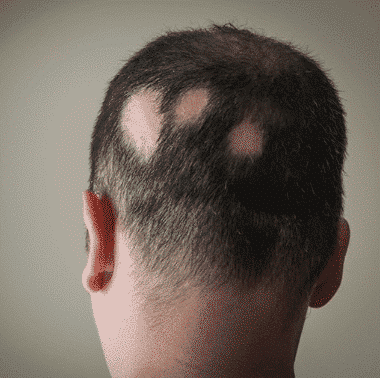Hair loss is a natural part of the aging process, but if your hair loss occurs in patches or chunks around your head it could be indicative of a medical condition known as alopecia areata. Dr. Vivian Bucay specializes in helping individuals understand and find a successful treatment for alopecia areata.
What is Alopecia?
Alopecia, also known as alopecia areata, is a medical condition that results in the loss of hair. It is classified as an autoimmune disorder because the body is attacking the hair follicles. When the body attacks the hair follicles, it causes the hair to fall out.
The amount of hair loss an individual experiences with alopecia areata will vary. Some individuals lose chunks or patches on their head, while others can lose all the hair on their head. In some cases the hair grows back, but not always.

Symptoms of Alopecia Areata
In addition to hair loss, patients suffering from alopecia may experience:
- Regrowth of fine, light colored hair
- Itching during stubble regrowth
- Regrowth of hair in one area and loss of hair in another.
Individuals suffering from abnormal hair loss tend to feel self-conscious, unattractive, and fall into depressive moods. If you are experiencing these symptoms, you may suffer from alopecia.
Is Alopecia Different From Baldness?
Baldness is a general term used to describe all hair loss. There are several different types of baldness. Alopecia areata is a specific type of baldness.
When a patient comes to us with what we suspect to be alopecia areata, we will conduct a visual examination of the scalp. We will take a close look at the area where the hair loss has occurred. We will also look at any of the hair surrounding it. This visual examination combined with the patient’s medical or family history is usually enough to diagnosis alopecia areata.
How Is Alopecia Diagnosed?
Alopecia areata can be diagnosed through diagnostic testing. Your doctor may order a microscopic examination of a strand of hair or a sample of the scalp. Another test option is a blood test to diagnose hyperthyroidism or hypothyroidism.
Who is at Risk for Alopecia Areata?
There is no way to determine exactly who is at risk for developing alopecia areata. Some people, such as those with an existing autoimmune disorder or a family history of autoimmune disorders may be at a higher risk for developing this condition. Unfortunately, there is no way to tell for sure who will or will not develop it.
Treatments for Alopecia
Currently, there is no cure for alopecia areata. There are options for treatment and management of the condition.
Some of the available treatment options may include injections of corticosteroids into the scalp, topical creams/gels, oral corticosteroids, topical contact sensitizers, or prescription drugs such as Rogaine. These treatments are designed to help reduce inflammation and help the hair possibly grow back.

The treatment/management plan for every individual will vary, as not all treatments work for everyone. Dr. Vivian Bucay and her staff can provide recommendations that allow you to create a unique personalized treatment/management plan for your alopecia areata.
Treatments for Alopecia
For most patients, alopecia is a temporary condition. However, 10% of patients with the condition experience permanent hair loss. You are more likely to have permanent hair loss if you:
- Suffer from allergies
- Developed the condition at a young age
- Have a family history of alopecia
- Suffer from an autoimmune disease
- Have had the condition for over a year
If your diagnosis is permanent, there are still solutions out there for you. Be sure to ask Dr. Vivian Bucay what the best course of action is for your alopecia.
Schedule Consultation
Going bald is an experience that many people hope to avoid in their lifetimes. Dr. Vivian Bucay offers treatment options and care to alopecia in the San Antonio, TX area. Contact us at 210.692.3000 for our La Casita office, or at 210.370.9995 for our Sonterra office. We look forward to helping you!
